外研版英语八年级上册Module 1 How to learn English Unit 3课件+嵌入音频(共35张PPT)
文档属性
| 名称 | 外研版英语八年级上册Module 1 How to learn English Unit 3课件+嵌入音频(共35张PPT) | 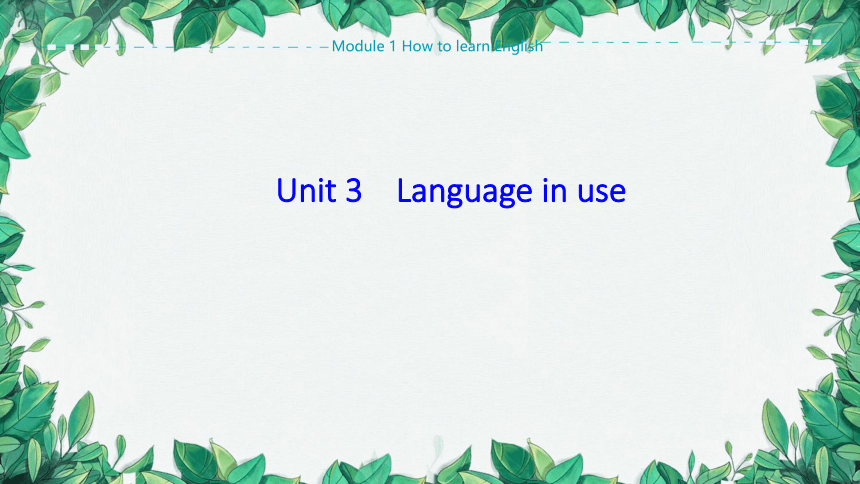 | |
| 格式 | pptx | ||
| 文件大小 | 7.0MB | ||
| 资源类型 | 教案 | ||
| 版本资源 | 外研版 | ||
| 科目 | 英语 | ||
| 更新时间 | 2023-06-21 06:25:30 | ||
图片预览


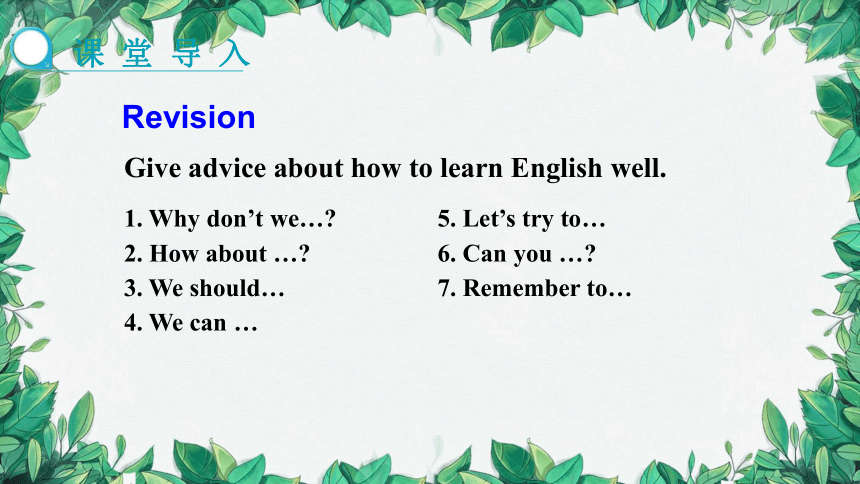
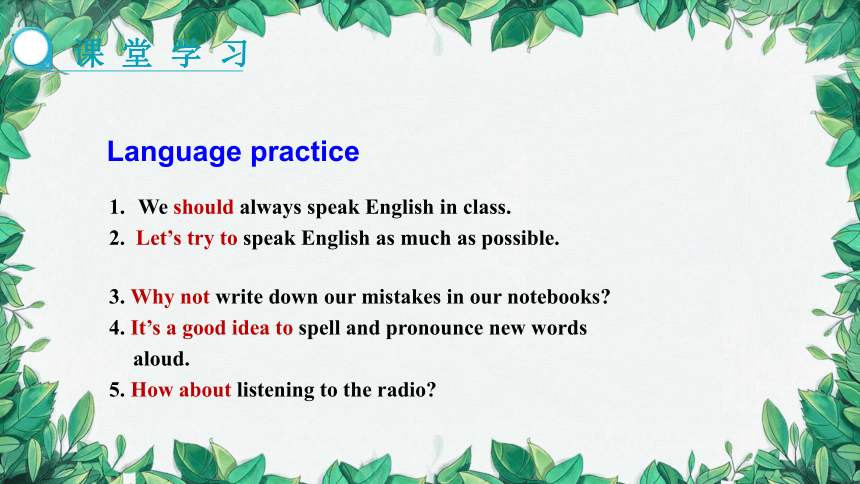


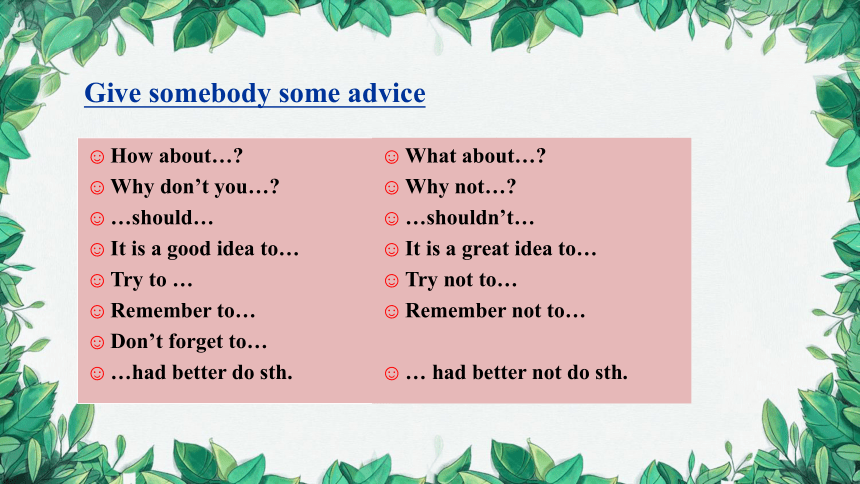
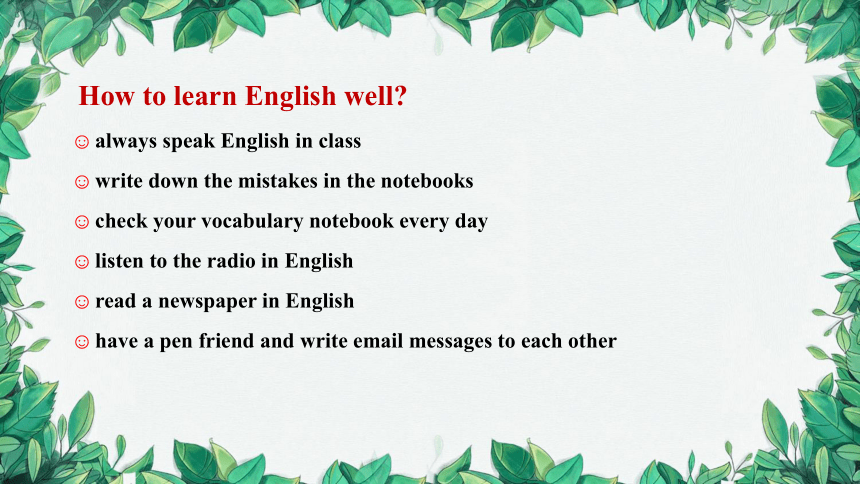
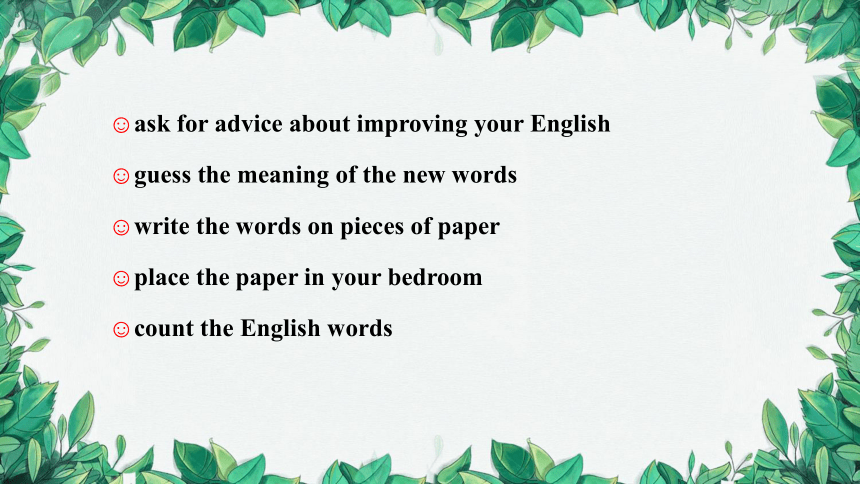

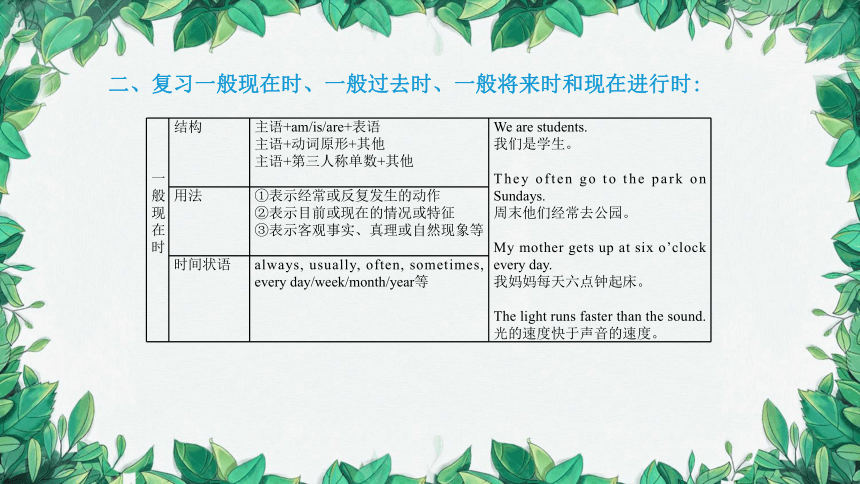

文档简介
(共35张PPT)
Unit 3 Language in use
Module 1 How to learn English
学 习 目 标
1
3
能够针对别人英语学习中存在的问题给出建议。
复习巩固寻求和给出建议的方法。
2
复习巩固本模块所学的生词和短语。
Revision
Give advice about how to learn English well.
1. Why don’t we…
2. How about …
3. We should…
4. We can …
5. Let’s try to…
6. Can you …
7. Remember to…
课 堂 导 入
3. Why not write down our mistakes in our notebooks
4. It’s a good idea to spell and pronounce new words aloud.
5. How about listening to the radio
We should always speak English in class.
2. Let’s try to speak English as much as possible.
Language practice
课 堂 学 习
一、征求意见的表达方式:
1. How can I …
2. What should I do
3. Can you give me some advice
4. What do you think I should do
Grammar
建议的表达方式总结如下:
Why don’t you/ we …
Why not…
What / How about …
Let’s try to …
We /You should …
It’s a good idea to …
Don’t forget to …
Remember to...
Give somebody some advice
How about…
Why don’t you…
…should…
It is a good idea to…
Try to …
Remember to…
Don’t forget to…
…had better do sth.
What about…
Why not…
…shouldn’t…
It is a great idea to…
Try not to…
Remember not to…
… had better not do sth.
How to learn English well
always speak English in class
write down the mistakes in the notebooks
check your vocabulary notebook every day
listen to the radio in English
read a newspaper in English
have a pen friend and write email messages to each other
ask for advice about improving your English
guess the meaning of the new words
write the words on pieces of paper
place the paper in your bedroom
count the English words
You should answer…
That is a good / great idea.
Great! / Good!
Thanks a lot. / Thanks very much.
一 般 现 在 时 结构 主语+am/is/are+表语 主语+动词原形+其他 主语+第三人称单数+其他 We are students.
我们是学生。
They often go to the park on Sundays.
周末他们经常去公园。
My mother gets up at six o’clock every day.
我妈妈每天六点钟起床。
The light runs faster than the sound.光的速度快于声音的速度。
用法 ①表示经常或反复发生的动作 ②表示目前或现在的情况或特征 ③表示客观事实、真理或自然现象等
时间状语 always, usually, often, sometimes, every day/week/month/year等
二、复习一般现在时、一般过去时、一般将来时和现在进行时:
一 般 过去 时 结构 主语+was/were+表语 主语+行为动词的过去式+其他 I was late for school yesterday afternoon.
昨天下午我上学迟到了。
I studied in a middle school ten years ago.
十年前我在一所中学学习。
He called me last night.
昨天晚上他给我打电话了。
用法 表示过去某个时间发生的动作或存在的状态
时间状语 yesterday,last night/week/month/year, three days ago, in 2010,just now等
一 般 将来时 结构 主语+will/shall +动词原形 主语+be going to+动词原形 We will have a party for Kate next Friday.
下周五我们将为凯特举办一个聚会。
They are going to join an English club.
他们打算加入一个英语俱乐部。
用法 表示将要发生的动作或存在的状态
时间状语 tomorrow,next week/month/year, in the future等
现在进行时 结构 主语+am/is/are +动词-ing形式 Now the students are reading English.
现在学生们正在读英语。
Look! The girl is dancing.看!
这个女孩正在跳舞。
用法 表示现在正在进行或发生的动作
时间状语 now, right now, at the moment等;注意:当句首有look, listen等词时,句子也多用现在进行时
1 Listen and check( ) the expressions of
advice you hear.
1 Why don’t we …
2 How about …
3 We should …
4 We can …
5 Let’s try to …
6 Can you …
7 Remember to …
√
√
√
√
√
√
√
2 Listen again and answer the questions.
What is difficult for Charlie
2. How will Mary help him
3. When does Charlie think they should meet
The English homework is difficult for him.
She offers to work with him.
After school that day.
4. Why does Mary think about reading newspaper
Mary thinks reading newspaper is a good idea.
3 Work in pairs. Look at the picture and say what Jack usually does.
Do you think his habits are good Why/Why not
He usually goes to bed late.
He usually gets up late.
He usually listen to the teacher carefully.
He usually speaks Chinese in class.
He doesn’t use dictionary.
He usually writes words on the notebook.
He should go to bed before nine o’clock.
Why don’t you …
Why not …
How about …
You should …
4 Give Jack some advice.
He should go to bed before nine o’clock, and get up at half past six.
2. What about writing words in groups
3. It’s a good idea to use dictionary.
4. How about listening to the radio or watching English movies
5 Read Helen’s question and complete Diana's answer with the correct form of the word and expressions in the box. You need to use some of the expressions more than once.
how about should try to
why don’t why not
FROM: Helen
TO: Diana
SUBJECT: How to improve speaking
Hi, Diana,
I like English very much. My reading is good, but my speaking is poor. How can I improve my speaking
Best,
Helen
FROM: Diana
TO: Helen
SUBJECT: RE: How to improve speaking
Hello, Helen,
You need to practice speaking more often. (1) _________ you look for some English-speaking people in your town (2) ___________ saying hello to them and asking them where they come from
Why don’t
How about
(3) _______ make friends with them and take them around your town.
Is there an English club in your town If there is not, (4) __________ start
one with your friends (5) __________ playing a few games and listening to some music You can watch English films together, and (6) ___________ speak English all the time. Then you (7) ______ invite your new English friends to your club!
Best,
Diana
Try to
why not
How about
try to
should
创办;开办;开始
one:指同类人或物中的一个;it指前面提到的同一人或物
6 Work in pairs. Read the problems and give advice.
Ask your teacher read loud
talk to your classmates
use a dictionary
Student A’s problems
I like listening to English songs, but there are too many new words.
I want to read an English book, but I can’t choose the right one.
Student B’s problems
I can’t speak English well.
It’s difficult to remember new words.
Now, write down your advice.
For student A:
How about using a dictionary to find the meaning of new words
Why don’t you ask your teacher to choose an English book for you
For students B:
Why not practise talking to your classmates
You can read new words aloud.
7 Complete the conversation with the words in the box.
advice check forget
improve possible
Helen: How can I (1)__________my reading
James: Here is my (2) __________. Choose a newspaper to read. First think about what’s
improve
advice
happening today. What will be in the newspaper?Then read the titles of articles and choose one to read for more information. Don’t stop to (3)________every word. You don’t need to know every word to understand the article. Learning only a few new words is enough. Try to use them as much as (4)________. Then you won’t (5) __________them easily.
possible
forget
check
stop to do sth.停下来去做某事;stop doing sth.停止做某事
English online
In addition to English magazines, newspapers and radio, there are various kinds of English learning websites. Millions of people around the world visit them daily to improve their English. If someone from Spain asks a question, they may get an answer from Canada instantly. On the internet, you can chat with other English speakers freely, learn world-famous universities’ online courses in English, and enjoy the most current English songs. The internet brings the world of English to you.
Module task
8 Write down what you’re not good at in English.
Now write down what you should do.
What I am not good at What I should do
9 Make an English study plan for this year. Use the information in Activity 8 to help you.
★Read English aloud every morning.
★See some English movies and listen to more English songs.
★Read English magazines, newspapers and stories.
★Communicate with foreigners as much as possible.
...
10 Work in pairs. Discuss your study plan.
That’s a good idea. You
can also listen to
some English songs.
This is my English
study plan. I will listen
to English radio
programmes every
day.
11 Think about your partner's advice and revise your English study plan.
Homework
2.Make an English study plan for this year. Use the information in Activity 8 to help you.
1.Review the useful words and expressions.
Thank you !
Unit 3 Language in use
Module 1 How to learn English
学 习 目 标
1
3
能够针对别人英语学习中存在的问题给出建议。
复习巩固寻求和给出建议的方法。
2
复习巩固本模块所学的生词和短语。
Revision
Give advice about how to learn English well.
1. Why don’t we…
2. How about …
3. We should…
4. We can …
5. Let’s try to…
6. Can you …
7. Remember to…
课 堂 导 入
3. Why not write down our mistakes in our notebooks
4. It’s a good idea to spell and pronounce new words aloud.
5. How about listening to the radio
We should always speak English in class.
2. Let’s try to speak English as much as possible.
Language practice
课 堂 学 习
一、征求意见的表达方式:
1. How can I …
2. What should I do
3. Can you give me some advice
4. What do you think I should do
Grammar
建议的表达方式总结如下:
Why don’t you/ we …
Why not…
What / How about …
Let’s try to …
We /You should …
It’s a good idea to …
Don’t forget to …
Remember to...
Give somebody some advice
How about…
Why don’t you…
…should…
It is a good idea to…
Try to …
Remember to…
Don’t forget to…
…had better do sth.
What about…
Why not…
…shouldn’t…
It is a great idea to…
Try not to…
Remember not to…
… had better not do sth.
How to learn English well
always speak English in class
write down the mistakes in the notebooks
check your vocabulary notebook every day
listen to the radio in English
read a newspaper in English
have a pen friend and write email messages to each other
ask for advice about improving your English
guess the meaning of the new words
write the words on pieces of paper
place the paper in your bedroom
count the English words
You should answer…
That is a good / great idea.
Great! / Good!
Thanks a lot. / Thanks very much.
一 般 现 在 时 结构 主语+am/is/are+表语 主语+动词原形+其他 主语+第三人称单数+其他 We are students.
我们是学生。
They often go to the park on Sundays.
周末他们经常去公园。
My mother gets up at six o’clock every day.
我妈妈每天六点钟起床。
The light runs faster than the sound.光的速度快于声音的速度。
用法 ①表示经常或反复发生的动作 ②表示目前或现在的情况或特征 ③表示客观事实、真理或自然现象等
时间状语 always, usually, often, sometimes, every day/week/month/year等
二、复习一般现在时、一般过去时、一般将来时和现在进行时:
一 般 过去 时 结构 主语+was/were+表语 主语+行为动词的过去式+其他 I was late for school yesterday afternoon.
昨天下午我上学迟到了。
I studied in a middle school ten years ago.
十年前我在一所中学学习。
He called me last night.
昨天晚上他给我打电话了。
用法 表示过去某个时间发生的动作或存在的状态
时间状语 yesterday,last night/week/month/year, three days ago, in 2010,just now等
一 般 将来时 结构 主语+will/shall +动词原形 主语+be going to+动词原形 We will have a party for Kate next Friday.
下周五我们将为凯特举办一个聚会。
They are going to join an English club.
他们打算加入一个英语俱乐部。
用法 表示将要发生的动作或存在的状态
时间状语 tomorrow,next week/month/year, in the future等
现在进行时 结构 主语+am/is/are +动词-ing形式 Now the students are reading English.
现在学生们正在读英语。
Look! The girl is dancing.看!
这个女孩正在跳舞。
用法 表示现在正在进行或发生的动作
时间状语 now, right now, at the moment等;注意:当句首有look, listen等词时,句子也多用现在进行时
1 Listen and check( ) the expressions of
advice you hear.
1 Why don’t we …
2 How about …
3 We should …
4 We can …
5 Let’s try to …
6 Can you …
7 Remember to …
√
√
√
√
√
√
√
2 Listen again and answer the questions.
What is difficult for Charlie
2. How will Mary help him
3. When does Charlie think they should meet
The English homework is difficult for him.
She offers to work with him.
After school that day.
4. Why does Mary think about reading newspaper
Mary thinks reading newspaper is a good idea.
3 Work in pairs. Look at the picture and say what Jack usually does.
Do you think his habits are good Why/Why not
He usually goes to bed late.
He usually gets up late.
He usually listen to the teacher carefully.
He usually speaks Chinese in class.
He doesn’t use dictionary.
He usually writes words on the notebook.
He should go to bed before nine o’clock.
Why don’t you …
Why not …
How about …
You should …
4 Give Jack some advice.
He should go to bed before nine o’clock, and get up at half past six.
2. What about writing words in groups
3. It’s a good idea to use dictionary.
4. How about listening to the radio or watching English movies
5 Read Helen’s question and complete Diana's answer with the correct form of the word and expressions in the box. You need to use some of the expressions more than once.
how about should try to
why don’t why not
FROM: Helen
TO: Diana
SUBJECT: How to improve speaking
Hi, Diana,
I like English very much. My reading is good, but my speaking is poor. How can I improve my speaking
Best,
Helen
FROM: Diana
TO: Helen
SUBJECT: RE: How to improve speaking
Hello, Helen,
You need to practice speaking more often. (1) _________ you look for some English-speaking people in your town (2) ___________ saying hello to them and asking them where they come from
Why don’t
How about
(3) _______ make friends with them and take them around your town.
Is there an English club in your town If there is not, (4) __________ start
one with your friends (5) __________ playing a few games and listening to some music You can watch English films together, and (6) ___________ speak English all the time. Then you (7) ______ invite your new English friends to your club!
Best,
Diana
Try to
why not
How about
try to
should
创办;开办;开始
one:指同类人或物中的一个;it指前面提到的同一人或物
6 Work in pairs. Read the problems and give advice.
Ask your teacher read loud
talk to your classmates
use a dictionary
Student A’s problems
I like listening to English songs, but there are too many new words.
I want to read an English book, but I can’t choose the right one.
Student B’s problems
I can’t speak English well.
It’s difficult to remember new words.
Now, write down your advice.
For student A:
How about using a dictionary to find the meaning of new words
Why don’t you ask your teacher to choose an English book for you
For students B:
Why not practise talking to your classmates
You can read new words aloud.
7 Complete the conversation with the words in the box.
advice check forget
improve possible
Helen: How can I (1)__________my reading
James: Here is my (2) __________. Choose a newspaper to read. First think about what’s
improve
advice
happening today. What will be in the newspaper?Then read the titles of articles and choose one to read for more information. Don’t stop to (3)________every word. You don’t need to know every word to understand the article. Learning only a few new words is enough. Try to use them as much as (4)________. Then you won’t (5) __________them easily.
possible
forget
check
stop to do sth.停下来去做某事;stop doing sth.停止做某事
English online
In addition to English magazines, newspapers and radio, there are various kinds of English learning websites. Millions of people around the world visit them daily to improve their English. If someone from Spain asks a question, they may get an answer from Canada instantly. On the internet, you can chat with other English speakers freely, learn world-famous universities’ online courses in English, and enjoy the most current English songs. The internet brings the world of English to you.
Module task
8 Write down what you’re not good at in English.
Now write down what you should do.
What I am not good at What I should do
9 Make an English study plan for this year. Use the information in Activity 8 to help you.
★Read English aloud every morning.
★See some English movies and listen to more English songs.
★Read English magazines, newspapers and stories.
★Communicate with foreigners as much as possible.
...
10 Work in pairs. Discuss your study plan.
That’s a good idea. You
can also listen to
some English songs.
This is my English
study plan. I will listen
to English radio
programmes every
day.
11 Think about your partner's advice and revise your English study plan.
Homework
2.Make an English study plan for this year. Use the information in Activity 8 to help you.
1.Review the useful words and expressions.
Thank you !
同课章节目录
- Module 1 How to learn English
- Unit 1 Let's try to speak English as much as possi
- Unit 2 You should smile at her.
- Unit 3 Language in use .
- Module 2 My home town and my country
- Unit 1 It's taller than many other buildings.
- Unit 2 Cambridge is a beautiful city in the east o
- Unit 3 Language in use .
- Module 3 Sports.
- Unit 1 Nothing is more exciting than playing tenni
- Unit 2 This year we training more carefully.
- Unit 3 Language in use .
- Module 4 Planes, ships and trains .
- Unit 1 He lives the farthest from school.
- Unit 2 What is the best way to travel.
- Unit 3 Language in use .
- Module 5 Lao She Teahouse.
- Unit 1 I wanted to see the Beijing Opera.
- Unit 2 It descibes the changes in Chinese society.
- Unit 3 Language in use .
- Module 6 Animals in danger.
- Unit 1 It allows people to get closer to them .
- Unit 2 The WWF is working hard to save them all.
- Unit 3 Language in use .
- Revision module A
- Module 7 A famous story
- Unit 1 Alice was sitting with her sister by the ri
- Unit 2 She was thinking about her cat.
- Unit 3 Language in use .
- Module 8 Accidents
- Unit 1 While the car were changing to red, a car s
- Unit 2 I was trying to pick it up when it bite me
- Unit 3 Language in use .
- Module 9 Population
- Unit 1 The population of China is about 1.37 billi
- Unit 2 Arnwick was a city with 200,000 people.
- Unit 3 Language in use .
- Module 10 The weathe
- Unit 1 It might snow.
- Unit 2 The weather is fine all year round.
- Unit 3 Language in use .
- Module 11 Way of life
- Unit 1 In China ,we open a gift later.
- Unit 2 In England, you usually drink tea with milk
- Unit 3 Language in use .
- Module 12 Help
- Unit 1 What should we do before help arrives?
- Unit 2 Stay away from windows and heavy furniture.
- Unit 3 Language in use .
- Revision module B
